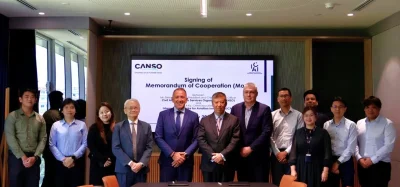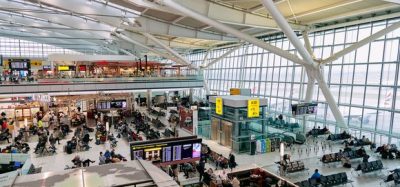In the hotseat with Phil Forster, Teesside International Airport
- Like
- Digg
- Del
- Tumblr
- VKontakte
- Buffer
- Love This
- Odnoklassniki
- Meneame
- Blogger
- Amazon
- Yahoo Mail
- Gmail
- AOL
- Newsvine
- HackerNews
- Evernote
- MySpace
- Mail.ru
- Viadeo
- Line
- Comments
- Yummly
- SMS
- Viber
- Telegram
- Subscribe
- Skype
- Facebook Messenger
- Kakao
- LiveJournal
- Yammer
- Edgar
- Fintel
- Mix
- Instapaper
- Copy Link
Posted: 19 December 2022 | | No comments yet
For Issue 6 2022, Phil Forster, Managing Director, Teesside International Airport, answers our quick-fire questions on the future of his airport.


How is the recovery going?
It’s been a very good summer. The season has seen strong performance for destinations operated by Ryanair and Tui. Average load factors are topping the high 90s when it comes to percentages, and these are more than double those we achieved in 2021.
The pandemic wasn’t good for anyone in the aviation industry – but we bounced back very quickly. We were helped as we didn’t make any of our staff redundant during the crisis, which put us in a much better position once flights returned. It all meant we didn’t see any of the problems seen at other UK airports.
What trends have you seen with your passengers? What is it they want from you as an airport now?
Our passengers are keen to see more flights to a range of destinations – be that for summer sun or city breaks. The good uptake in flights this summer is really promising.
We’re also giving our passengers more options such as the new Sky Bar available landside in check-in without needing to pass through security, and the Goosepool Bar airside. Plus, our exclusive business lounge designed by one of our partners, Rockliffe Hall, a five-star resort just 15 minutes from the Airport. World Duty Free also opened up earlier this year as part of a 12-year deal, and we’ve got the Bannatyne Spa where passengers can enjoy a spa treatment before boarding their flight.
What passenger experience initiatives are you running and what technology are you deploying to try and make their journey as seamless, and also predictable, as possible?
Making the journey through check-in to airside as smooth and efficient as possible has been a key aim. We’ve invested in a C3 X-ray baggage scanner to make the journey through security even faster as passengers can leave electronics and liquids in their bags. We also refurbished an additional boarding gate to serve passengers taking advantage of Ryanair’s summer holiday flights.
What are you doing to diversify your revenue streams?
There is plenty going on at the wider airport. The airport has been included in the Teesside Freeport which brings benefits other hubs simply don’t have when it comes to stamp duty, customs benefits and business rates. This also ties into the airport’s £2.5 million cargo facility which opened at the end of August. We’ve got a business park taking shape at the southern end of the airport site with 3.4 million ft² of flexible office, logistics and commercial space across 270 acres. Draken Europe is set to expand its operations with a second hangar, and aviation giant Willis have plans for a £25 million Aircraft Maintenance Facility and Jet Centre. We’re working hard on building our freight capabilities and accelerating our ambitions to develop sustainable aviation fuel. Additionally, we’re looking at bringing a lot of our services in‑house.
What are the most exciting developments happening at the airport next year?
Freight: the facility is there, but we can now really start to implement our strategy. The groundwork has gone in, but now we can get it up and running. Our plans and ambitions for sustainable aviation fuel are also at the cutting edge, and the development of the South Side Business Park is really starting to ramp up. We’ve got a rich chemical industry in Teesside and we want to develop our plans to be the world’s first airport developing its own sustainable aviation fuel.
What’s on your to-do list as Managing Director for 2023?
To get the airport back into profitability, grow our passenger numbers and freight volumes, and to create more jobs for local people. We’re also looking to reduce our carbon footprint, which really ties into our sustainable fuel plans.
Biography


Phil Forster began his career in aviation in role of Media & Public Affairs Manager at Newcastle Airport. After spending three years at the northeast airport, Forster moved to Leeds Bradford Airport firstly in the role of Aviation Development & Corporate Affairs Manager, before progressing to become the airport’s Head of External Affairs. Forster led the airport’s public affairs strategy, including lobbying on aviation strategy and capacity and was heavily involved in the airport’s aeronautical and commercial operation, aimed to put customer experience at the heart of the business strategy while boosting the airport’s international connectivity. He joined Teesside International Airport as Commercial Director in 2019, before taking on the role of Managing Director in 2020. He is responsible for overseeing Teesside International and its redevelopment plans, to ensure the airport is ready for the expected increase in passenger numbers resulting from securing new domestic and holiday services.
Issue
Related topics
Air freight and cargo, Airport development, Airside operations, Baggage handling, Cargo, COVID-19, Non-aeronautical revenue, Passenger experience and seamless travel, Sustainability, Sustainable Aviation Fuel (SAF), Terminal operations


















